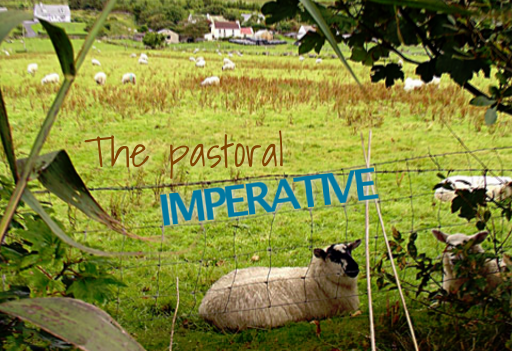I’m aware this blog has a readership in the US and in France as well as in the UK. I’m not sure how widespread Christian Unions (CUs) are in American universities, and I know they are nearly non-existent in France. So, to those outside the UK, you may find this post less relevant, and I’m sorry about that; but please bear with me as the issues raised may be relevant to your ministry. First, let me give a bit of background about CUs.

In theory, CUs have a very laudable purpose: to share with people on university campuses and in colleges the Gospel. In theory, then, Christian Unions are merely evangelistic organisations. They are, in my experience, quick to warn members that they are not church, and that they do not, and should not, replace church. All very well in theory; but the place the CUs have in student Christian life is different. To understand their actual function, official and normative documents cannot suffice; rather, the origin of the CU movement should let us know where it fits and how it is used (1).
The UCCF is the national organisation to which CUs are affiliated. It started off, under a different name, as a reaction to perceived liberalism from SCM, and started in a logic of opposition to an organisation which was committed to ecumenism and which tried to cater for a wider spectrum of Christianity (in particular with respect to the place of atonement and Biblical infallibility). Evangelism soon became central to the work of the UCCF, something which could no longer be said of SCM.
Cue forward to 2013. UCCF-affiliated CUs are present in most universities; and often are the main Christian presence on campus. But the logic of dualism and opposition, and in many ways pride, which started off the movement, is still strongly rooted in them. It shows, in particular, through the emphasis on its Doctrinal Basis (DB, around which many tensions are crystallised), which serves mostly as an engine of distinctiveness: our way of imagining Christianity is the only way; these are the essential truths to which we hold, as a Christian Union. Want to know whether we hold your denomination as Christian? Check your beliefs against the DB. How far are we from the historical commitment to ecumenism of pre-split SCM; or even from the commitment to unity stated by the UCCF?
Mike Reeves, from UCCF, tries to justify this central position of the DB through reference to the long-lasting tradition in the churches of having creeds; but an ontological analogy cannot serve to win a functional argument: the DB has no doxological value, that is, it is not conceived as a statement of praise. If it is to be compared to anything functionally, the 39 articles of faith of the Anglican church are a better match; but these do not hold as central a place as the DB holds; and while the former were redacted with the aim to bring continuity to the experience of parishioners after a mostly politically-motivated change (2), the latter stems from a stand-offish attitude that tries to build barriers around a very specific view of Christianity. The contents of the DB themselves could be the topic of another series of posts, but those would easily degenerate into petty theological arguments, and prove divisive rather than uplifting. Suffice it to say, to appease the spirits of my CU friends, that I agree with what they point towards, even though I find the wording sometimes unhelpful.
Since the 1919 split, then, this commitment to a specific view of Christianity as opposed to others has remained part of CUs’ identity. But as offshoots of SCM affiliates, CUs share some of its traits, functionally. A CU is, functionally, a group of Christians on campus, and provides for them ways to explore their faith and to enjoy fellowship with one another. It leads to strong friendships, and to great growth. I am grateful for the role the local CU has played in my life, in giving me the chance to grow and test my gifts in various areas. I am grateful, also, for its official purpose of evangelism, and for the many people who could be blessed through our local action. But all the things that the CU does are meant to be geared towards evangelistic action.
- Living holy lives turns into being good witnesses.
- Baptisms are seen primarily as opportunities for evangelism.
- Giving a warm welcome becomes a gateway for evangelism and that alone – even if covertly.
- The ultimate aim of Christian life becomes the Great Commission, not the commandment to love God and to love one another – although these might be taken as read.
- Churches are partners and equippers for evangelism. In particular, church can (although by no means always) becomes restricted to Sundays, with the CU taking over for the rest of the week for all Christian activity.
Why do I think this is detrimental to the furthering of the Kingdom? Because it has a double effect of boxing in Christianity into evangelism, thereby denying its members the full experience and joy of Christianity; and of boxing evangelism into an activity which we were commanded to do, rather than as something that flows from an outpouring of love for Christ and a desire to imitate him. Let me explain this a bit further: several people get involved in evangelistic activities because they are put on by the CU and by its small groups, and because there’s little better to do on a Friday night.While it is good that this happens, and that many are reached through such activities, it leaves me wondering whether it might not be a hypocritical way of engaging with others; and how sustainable it is: that is, how people would behave once they leave uni and no longer have these activities.
Of course, it may not be the job of the CU to do anything other than evangelise; but as long as they remain the main Christian presence on campus, the very people they reach out to will experience a very limited aspect of Christianity, especially if the church they get directed to is a Sunday thing. That’s how some of my friends who became Christians through the CU affirm, with great conviction, that the only purpose of us as followers of Christ is to make more disciples.
It can seem ironic, or hypocritical, that I would promote Christian unity and holistic Christian life by giving such a damning profile of Christian Unions. But as I see it, there are two ways Christian Unions can take – two strands of their DNA they can choose to follow, but keeping both of them together will lead to the problems I outlined:
- either embrace the part of their heritage which comes from SCM, and become a community of Christians on campus – a union of Christians on campus. But if it chooses to do so, it needs to embrace other parts of Christian life or risk leading its members as well as those it reaches out to, to a cheapened version of Christianity: a commodity rather than a pervasive identity. For that, it needs to face the daunting task of ecumenism and shake off the parts of its make-up that come from wanting to be distinctive from SCM.
- or embrace the focus on a purely evangelistic activity. But if it chooses to do so, it needs to stop being “the” Christian presence on campus: it needs to stop being the go-to place for young Christians joining university and even for the people it reaches out to, and leave that to others. And that might have to go through a reduction of its activities, where and when they take up the bulk of the week.
In any case, it needs to bridge the gap between its ontological and its functional identities. If it doesn’t, it will bring up a generation of people who pay lip service to Christianity but restrict it to evangelistic action. That would be (pardon the pedantry) bringing the Kingdom farther but not further, making it wider, but doing so at the expense of meaning and of joy, and leaving for many a shallow experience of Christianity.
Bringing the Good News to strangers and to friends is, in both cases, still very relevant and part of the DNA of the CUs. But it cannot be exclusive, or it cannot functionally claim exclusivity over Christianity on campus.
—
(1) Most of this history I get from Wikipedia. I’m old, I know – but not quite old yet to know this history first-hand. If you know better than Wikipedia, do let me know! UCCF have also put together their own video to relate their history, although no mention of SCM is made. Equally, SCM relate their own history without mentioning the UCCF.
(2) This analysis is from ATP Williams – although, admittedly, article 22 is worded in a fairly stand-offish way.



